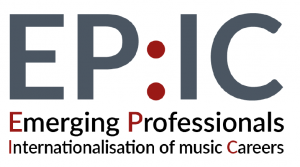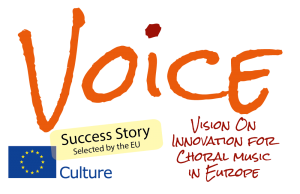Guidelines and Handbooks for Free Download
The Guidelines and Handbooks below have been developped mostly in the frame of different EU-funded projects since 2015, in cooperation with numerous partners throughout Europe.
Feel free to download and use those documents, we hope they will be an inspiration to your work!
Collective Singing as a Tool for Integration

The Sing Me In project explored possibilities of how to use collective singing as a tool to help the integration of people from different cultures and backgrounds.
- 1 – Singing with Groups of Young Refugees
- 2 – Including Young People with Migrant Background in Existing Choirs
- 3 – Working in a School Environment
- Repertoire Guide
More information on the project and translations of the Handbooks in ten more languages (ar, ca, de, es, et, fi, fr, nl, no, tr) can be found on www.SingMeIn.eu. A translation into your own language is not yet available and you would like to help us making it happen? Please contact us!

Youth Engagement in Cultural Organisations
Youth Involvement in cultural organisations
Supporting new generations of decision-makers
As a result of several questionnaires launched, as well as hosting a Zoom Café together with the members of the European Choral Association and beyond, the Youth Committee wished to investigate the ways in which young people were or are involved as decision-makers in the choral community, and in which ways young people are involved in an organisation.
Together with the experience and the knowledge collected by the youth committee, all the contributions received were bundled into a handbook on youth involvement, which explains in detail, as well as provide tools for convincing young people to get involved in decision-making and giving young people such an opportunity. With this handbook, we wish for increased ease of associations and any other organisations to easily involve young people in their processes in the future.
EP:IC - Data Analysis
The EPIC project, co-funded by the Creative Europe programme of the EU, provided emerging musicians with skills and professional experience to complement their formal training and help them boost their career at the international level.
During the project, so far, we have been planning four webinars for developing the skills and knowledge of young choral professionals.
Learn more about it here.
A core part of the EPIC project was a data collection intended to map the career paths of former members of auditioned youth music ensembles, both choirs and orchestras, on an international and national/regional level. A survey was sent out in late 2020 and early 2021 to alumni of the World Youth Choir, the EuroChoir, and a network of managers of national and regional youth choirs and orchestras. The data was analysed by Alfred Jürgens (European Choral Association Project Manager) and Inês Moreira (World Youth Choir Manager) to create a resource to show the results and conclusions that can be drawn from the nearly 500 responses received.
Download the Data Analysis Report here!
The project is coordinated by the European Choral Association in partnership with:


STAMP - material for managers, management training
STAMP | Shared Training Activities for Music Professionals
Toolbox and guidelines for (young) managers and Handbook for potential organisers of a training programme for (young) managers.
- Toolbox for Event Managers
- Different Guidelines for Managers
- Guidelines on how to organise a Young Event Management Programme (YEMP)

Environmental Sustainability
- Environmental Strategy and Policies of the European Choral Association – In March 2023, the European Choral Association published its first environmental sustainability and strategy which is based on the guidelines developed in the frame of the SHIFT Project (2019-2022), coordinated by the European Music Council and co-funded by the EU Erasmus+ programme. The European Choral Association was a partner in this project where the process for the SHIFT Eco Certificate for European cultural networks was started. www.shift-culture.eu
Guidelines developed in the frame of the IGNITE project co-funded by the EU

- Environmental protection and Climate Change: Food for thought – Catalogue of questions for choral organisations, choirs and singer who want to include environmental measures in their daily work.
- Denkanstöße zum Thema Umweltschutz und Klimawandel [DE] – Für Chororganisationen, Chöre und Sänger*Innen.
Document developed in the frame of the project “Upgrade – Connect – Reach Out: Raising Awareness for Collective Singing in Europe”

Low Budget events
Guidelines on how to organise a low-budget choral festival – Based on our experience with the festival YOUTH CHOIRS IN MOVEMENT 2019.
Guidelines developped in the frame of the project “Upgrade – Connect – Reach Out: Raising Awareness for Collective Singing in Europe”

SHIFT - Material for Cultural Leaders
The European Choral Association – Europa Cantat is a partner in the project SHIFT – Shared Initiatives for Training, coordinated by the European Music Council and co-funded by the European Union Erasmus+ Programme.
Climate change, gender equality and inclusion of minorities are key challenges for our rapidly changing world. Arts and culture have a recognised role in shaping societies and have the potential to significantly contribute to a better and more sustainable future for all as recognised in the UN Sustainable Development Goals (SDGs). The project SHIFT will provided training initiatives for cultural leaders, working together and creating paths to face such global challenges.
The partners will produced online manuals and guidelines between December 2019 and January 2022 on the following themes:
- Cultural Leadership
- Climate Change, Environmental Sustainability
- Inclusion (in the responsibility of the European Choral Association)
- Gender & Power-Relations
Some of the resources on Inclusion and Gender and Power-Relations were translated into French and Italian.
The translations are available on this page.

Singing Europe - Data Collection
Final report of the pilot research project “Singing Europe” published in 2015 in the frame of the VOICE project, coordinated by the European Choral Association – Europa Cantat and co-funded by the European Union Culture2000 programme.
Based on two years of exploration of data sources, and through innovative surveys, the report shows that 4,5% of the European population actively participates in collective singing activities. This represents 37 Million collective singers on the European continent, gathered in about 1 million choirs or ensembles.
- Full Singing Europe report (PDF – EN)
- Résumé du rapport Singing Europe (PDF – FR)
- Zusammenfassung des Singing Europe Berichts (PDF – DE)

WEBSITE ACCESSIBILITY GUIDELINES
In the framework of the EU-funded project IGNITE, we designed guidelines for website accessibility to empower content creators and all stakeholders of the European Choral Association and its members involved in the web development process with the knowledge and tools necessary to make the first steps towards accessible and inclusive websites. By producing these guidelines, we aim to contribute to a more inclusive digital landscape where everyone, regardless of their background or abilities, can navigate, interact, and engage with content seamlessly.
Check out the guideline here: Guideline for website accessibility
Fair Pay Recommendations for international events
The European Choral Association is a member of the European and International Music Council (IMC) and subscribes to the Five Music Rights developed by them.The 5th right is the right for all musical artists “to obtain just recognition and fair remuneration for their work”. This right has often not fully been respected in the choral sector in the past.
The European Choral Association therefore decided to research what could be “fair pay” for choral conductors and vocal leaders working at international events, as conductors of auditioned international ensembles, as workshop leaders, masterclass leaders or lecturers, as well as for composers who are commissioned a choral work.
These recommendations are the result of this work and were partly applied for the first time at the event Leading Voices in Utrecht, The Netherlands.
Check it out here: Fair Pay Recommendations for International Events

